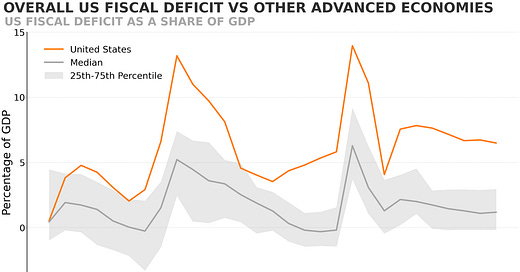Deficit Fuelled Growth and America’s Great Privilege
Government spending is part of the story of why US growth has outpaced Europe

A lot has been written about the strength of the US economy and the comparative weakness of Europe. In the UK there’s no denying that growth has been pitiful and that there is a general sense of doom and gloom. It’s a lack of entrepreneurial spirit; a tax system that favours property over income, the old over the young; an inability to build houses let alone infrastructure; an increasingly sick and inactive workforce.
While much of this is true, there’s one factor I hear a lot less about – and that’s just how much money the US government has been pumping into the economy relative to other nations.
This is clear from the IMF analysis below. Since 2000 the US fiscal deficit (the difference between government revenues and spending) has consistently been two to three times higher than the median level of other advanced economies.
This isn’t just bigger stimulus following an economic downturn (although that did happen following the GFC and the pandemic). It’s bigger stimulus all the time. And it must have played at least some role in this picture of relative GDP growth.
Economists and investors widely acknowledge this. In an article last year PIMCO noted:
“The US social contract - large, deficit fuelled growth - has spurred a productivity and technology boom to the benefit of U.S. companies and stock investors”.
But many other commentators – and the public at large - tend not to. Large fiscal deficits represent government inefficiency and excessive spending. The size of the US debt is a drag on growth.
My hunch is we hear less about this because it doesn’t fit the narrative of American endeavour relative to European malaise. It’s a less chest-pumping story in which growth isn’t just about having a risk-taking attitude borne of the pioneer spirit. It’s about having the world’s reserve currency, the world’s safe-haven asset, and a greater capacity to borrow and spend beyond your tax base than any other country.
That’s still an exceptional position, and don’t get me wrong, the US has made the most of it. Productivity growth has accompanied high spending. Inflation has only been a factor in recent years. It’s just not always the story that you hear.
And it’s certainly not the story told by Trump, Elon and co., despite Tesla benefitting handsomely from such fiscal largesse. Sure, it had some good battery technology, and a maniacally driven CEO/salesman-in-chief. It also benefitted from over $2.5 billion in federal and state loans and subsidies, plus another $2.5 billion of indirect subsidies courtesy of California’s green energy policies.
What this means for the UK is double-edged. We can take solace in the fact that higher US economic growth doesn’t solely reflect British deficiencies. But we also can’t replicate that growth model, having neither the world’s reserve currency nor the world’s safe-haven asset.
When we did have the opportunity to borrow freely, we blew it.
Which unfortunately means more need for change, and more painful decisions.
America’s great privilege is being able to avoid them.







Osborne...the worst Chancellor of them all!
I believe it was a great mistake for the Labour Party to deride Truss's growth plan rather than embrace the sentiment but critique the details and provide some alternative ideas
This is so true - a 7% deficit in peace time with a growing economy is crazy. It will be interesting to see what happens with Trump as Bessent seems to genuinely believe that he can get back to 3% deficits by 2029 with 3% real growth rate. For all the antics it does seem like Trump genuinely wants to cut the deficit.